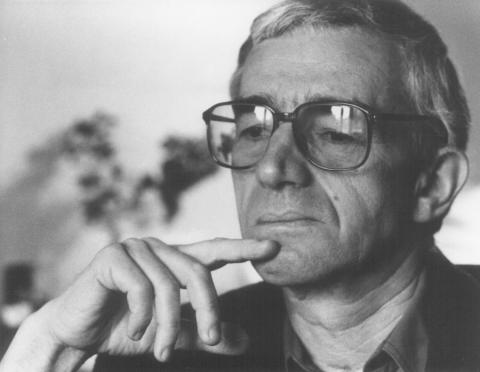Bodor Ádám: Biography
Ádám Bodor (Cluj Napoca, 22 February 1936 –)
Kossuth Prize-winning writer, awarded the title of Artist of the Nation, founding member of the Digital Literature Academy.
*
Born on 22 February 1936 in Cluj-Napoca to a Székely upper-middle class family with Reformed faith. His ancestors on his mother’s side were mostly civil servants, and on his father’s side Armenian-Hungarian landowners. His father, the moderately conservative, religious, and highly respected Bertalan Bodor, was appointed bank manager of the Budapest-based National Financial Institution Centre and the Pesti Savings and Loan Bank in 1944. After the war, he was invited to join the Provisional National Government in Debrecen, but the family settled back in Cluj-Napoca instead. The religious and cultural diversity of Transylvania, the inseparable mixture of Hungarian, Saxon, and Romanian cultures, and at the same time the lethargy, poverty, and vulnerability of the Eastern European environment were defining experiences for the writer, and it is partly this duality that he tries to capture in his works.
In Cluj, after the communist takeover, the Bodor family faced decades of deprivation. First they had to leave their villa, then the elderly father was convicted on trumped-up charges in a sham political trial, and he was only released in 1955. In 1952, Ádám Bodor himself, a student at Reformed College, was arrested for conspiracy against the state. He and his fellows were released after two years through the intercession of one of their fathers. Bodor worked as a factory worker for a year, and then, out of caution and necessity rather than deep religious conviction, enrolled in the Reformed College’s theology program instead of a secular course. He graduated in 1960 and was employed in the archives of the Cluj District Church. Between 1964 and 1968 he worked in a copy–translation office in his hometown.
He began publishing cartoons and short stories in Utunk in 1965. These early works show the influence of Hemingway. His first collection of short stories, The Witness (A tanú), was published in 1969. Although the aesthetic value of his carefully crafted short stories has not been questioned by many in the literary world, and he has generally received favourable reviews, some literary and public figures expressed their reservations about the lack of attention to the requirements of socialist realism. Since he was not allowed to work in the press for political reasons, he worked as a freelance writer instead. In the early seventies, Péter Bacsó and Zoltán Fábri both made films based on one of his short stories. In 1974, his second volume, Give or Take a Day (Plusz-mínusz egy nap) was published, followed by Arrival in the North (Megérkezés északra) in 1978. His first book published in Hungary, a selection entitled What Is a Mountain Pass Like? (Milyen is egy hágó?, 1980) was followed shortly afterwards by his last Hungarian-language book in Romania, The Zangezur Mountains (A Zangezur hegység, 1981), a collection of short stories.
In the late 1970s, his opportunities as a writer in Transylvania became increasingly limited and his living conditions more difficult, prompting a move to Hungary in 1982. In 1984, he became editor of Magvető Publishing House. His next collection of short stories, The Euphrates At Babylon (Az Eufrátesz Babilonnál), was published in 1985. The real breakthrough, however, came with winning first prize in the Holmi short story competition, and the publication of Sinistra Zone (Sinistra körzet) in 1992, which is considered Bodor’s most important work to date. In it, he depicts the workings of a totalitarian regime in a highly circumscribed, grotesque world with few characters, deep irony, and black humour. The question of genre regarding this cross between a novel and a short story has been the subject of ongoing debate in critical circles.
The Visit of the Archbishop (Az érsek látogatása, 1999) falls into a similar transitional genre, but it is not only in this respect that it is a continuation of Sinistra Zone: the setting is reminiscent of the zone, some of the characters are familiar, and the writing style is not substantially different.
The Birds of Verhovina (Verhovina madarai, 2011) recreates the world of the previous two novels, using similar prose-poetic methods. The difference is that the typical characters, attitudes, and oppressive life situations of a disaster-stricken, unspecified region are brought to life with black humour, further exposing the unresolved tension between hope and hopelessness.
Home to nine hot springs, Verhovina used to be rich in natural beauty, but it has now become a wasteland with only a few dozen inhabitants left. Trains to Verhovina are scarce; the timetable has been cancelled. One day, even the birds disappeared from the region. The village has lost virtually all contact with the outside world, though it seems to depend on some faceless, invisible power whose arrival always spells mysterious disappearance and violent death. The reader arrives in Ádám Bodor’s world, on the periphery of civilization, at the break of dawn. Adam, the foster son of Brigadier Anatol Korkodus, is waiting at the dilapidated station for a boy who is arriving from a reformatory school. Soon afterwards, Korkodus is arrested for unknown reasons. As the subtitle says, these stories are „variations on the last days”. Yet this decaying and sinister world, populated with people bearing fantastic names (Bodor’s trademark), is not devoid of a certain joie de vivre: people eat gourmet dishes, point out their interlocutor’s hidden motives with incredible acumen, and enjoy stunning natural beauty. Ádám Bodor’s novel is the description of a totalitarian society in all its irrationality, absurdity, and implacability – a description that alternately provokes laughter and shuddering in the reader. The Birds of Verhovina is oppressive and cruel without ever being gratuitously so; hilariously funny without being silly; magic and surreal without being gaudy or bombastic.
The biography was written by Tamás Scheibner, translated by Benedek Totth and Austin Wagner.

